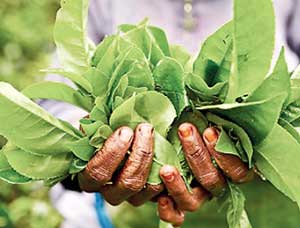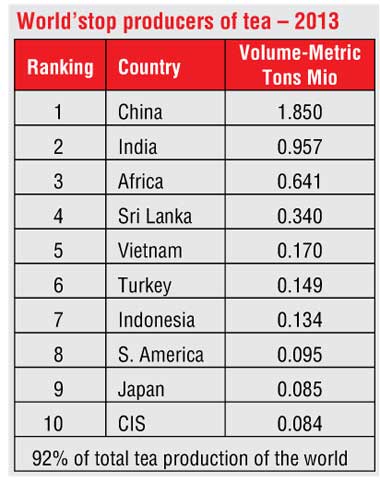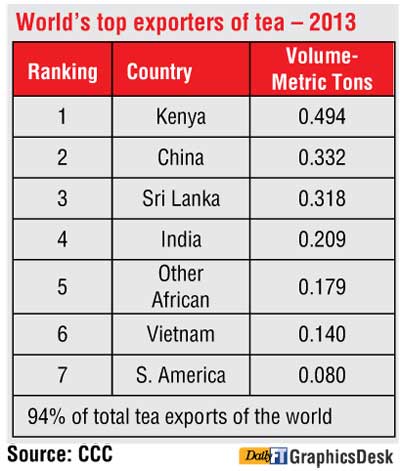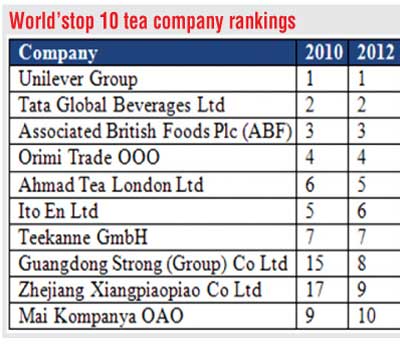Saturday Feb 14, 2026
Saturday Feb 14, 2026
Tuesday, 24 May 2016 00:01 - - {{hitsCtrl.values.hits}}
The tea plant was brought into the country by the British in 1824 for non-commercial purposes and later developed to be a key export commodity out of (Ceylon) Sri Lanka. Today Sri Lanka is the world’s fourth largest producer of tea and export revenue of tea contributes to around 2% of the country’s GDP. The industry provides employment through direct and indirect means closer to a million people.
In year 1965, Sri Lanka became the largest tea exporting country for the first time. In 1976 Sri Lanka Tea Board was founded. In the 1970s export of tea bags were also commenced by some producers. In 1982 production of green tea commenced. Total tea production grew to 300,000 metric tons by the year 2000.
Getting tea under commercial hub regulations
The charts give some of the global numbers we studied during 2013 before amending the Finance Act 12 of 2013 to make way for the commercial hub regulations. Sri Lanka is the third largest exporter of tea and contributes 17% of the world’s tea exports.
Protectionists have won? We have chosen to be the great bulk exporter for others to establish brands and hubs!
Given the status quo and the opportunity that won’t be there with us forever, the Minister of Finance in the 2016 Budget speech for the first time formally announced the policy decision to open up the tea industry to develop the tea hub concept which would have made a marked difference in foreign exchange earnings to Sri Lanka among many other positive attributes such as attracting greater numbers of tourists, setting up of educational institutions, developing new brands and organising promotional carnivals, etc.
However it seems that the protectionist lobby has once again won the day and have probably taken out the proposal out of the Government’s agenda to develop a true tea hub via the commercial hub act. Sri Lanka is probably the true tea hub that has its own plantations, knowledge and being the fourth largest producer and third largest exporter in the world sitting in the best logistics corridor to be the number one distribution centre of the region. But we are not! We have chosen to be the great bulk exporter for others to establish brands and hub!
Policy stuck inside the box
Now that Dubai, Singapore, Chennai, Indonesia, France and many other countries have joined the global blending and brand development distribution strategies, and countries like Australia and Canada are having Sydney Tea Festival and Vancouver Tea  Festival, it is unlikely that the second largest export item of Sri Lanka is going to expand on any large scale due to policy being stuck inside the box. Of course our competition who doesn’t produce tea will be very comfortable with the lethargic attitude of the Sri Lankan policy makers.
Festival, it is unlikely that the second largest export item of Sri Lanka is going to expand on any large scale due to policy being stuck inside the box. Of course our competition who doesn’t produce tea will be very comfortable with the lethargic attitude of the Sri Lankan policy makers.
In the year 2013, we worked with authorities to develop the commercial hub concept which was originally strategised in year 2000 where the current Finance Minister Ravi Karunanayake too took the initiative to join us in a committee to change the land scape of the country in trading, shipping and logistics to build a better country. In 2013 given the complicated and the strong lobby against liberalisation of trade we were successful in developing the commercial hub act which transformed the country that has a model of a “one country two systems for trading and logistics”.
Five companies are today successfully running the operations and are looking for more land for expansion. The only intention was to make Sri Lanka compete with Jebel Ali free zone and Singapore and some emerging transformations in India and providing a support agenda to the maritime hub concept given our unique location. This model not only protected the protectionists but brand protection too was considered to give government a comfort zone to manage lobby pressure. However custom schedule B was blocking tea and cinnamon to be handled in the hub companies which are considered as offshore and are in the business of re-exporting.
We were all positive that a pro-business friendly Government had taken over in 2015 and that many senior ministers were talking of game-changing policies and saying goodbye to protectionists, but we are yet to see the reforms taking off ground.
Lesson from the winds and sands of Dubai
In the interest of the readers and the policy makers, I have quoted an article of Dubai Trade Ministry of 2012; this was the year we started studying trading hub models and best practices to be adapted to the commercial hub regulations of Sri Lanka:
“Dubai could not be further from the world’s tea gardens or more central to tea’s heartbeat. By 2012 The United Arab Emirates was  the world’s largest re-exporter of tea, according to the Ministry of Foreign Trade. During the past five years the country has garnered a 60% share of the global re-export market. Tea arrives unfinished and is returned packaged, polished and profitable.
the world’s largest re-exporter of tea, according to the Ministry of Foreign Trade. During the past five years the country has garnered a 60% share of the global re-export market. Tea arrives unfinished and is returned packaged, polished and profitable.
“Dubai seems at first an unlikely site. The nearest tea is grown thousands of kilometres away. But modern tea is a complex blend of Indian, Sri Lankan, Nepali, Kenyan, Tanzanian, Ugandan and Indonesian black tea amid a growing Middle East market for Chinese, Vietnamese, Indonesian and Japanese green tea.
“Dr. Mattar Ahmad, head of the Ministry’s Analysis and Trade Information Department, found that the UAE is among the world’s top five tea importers, occupying second place from 2007 — 2011, with the exception of 2009, when it ranked third after the UK.
“Sri Lanka was the UAE’s top supplier providing 20% in 2010 but India shipped a sizeable 17,610 metric tons in 2011 and Kenya has shipped 13,912 metric tons through July 2012, according to statistics compiled by the International Tea Committee – Dubai Multi-Commodities Centre. As the deep water ports Mina Rashid and Mina Jebel Ali became the crossroads of the re-export industry, the Dubai Multi Commodities Centre (DMCC) emerged as one of the world’s most important hubs for processing and finishing tea.
“The DMCC’s Dubai Tea Trading Centre (DTTC) is a blending and packaging facility that today sends millions of finished 100 ct. cartons, tins and packets well beyond the Middle East. The 260,000 sq. ft. trading centre, built in 2005 and located in the Jebel Ali Free Zone, houses many tea companies and offers global tea producers and importers a wide range of services. DTTC, which handled 10.6 million kilos of tea in 2010, is currently expanding its capability which includes a large tea storage facility, blending and modern packaging equipment.
“The centre’s modern “tasting unit” and its research and development laboratory evaluate tea arriving from 13 producing countries including six African nations Middle Eastern producers such as Iran and Asian countries including India, Sri Lanka, Nepal, China and Indonesia.”
(See more at: http://worldteanews.com/news/dubai-is-now-worlds-top-tea-re-exporter#sthash.8LfIyCFu.dpuf)
It’s nothing but another sad story
Rationalising the above article, one can understand the difference between a reformist nation and others like ours.
In my columns to the public I always tried my best to boost the country’s maritime industry, because in my heart I know the  opportunity and the potential the country has for trade and logistics to alleviate poverty and the shortage of capital, for economic development if the right decisions are taken.
opportunity and the potential the country has for trade and logistics to alleviate poverty and the shortage of capital, for economic development if the right decisions are taken.
Over 25 years I have been studying, understanding and working in industries where multiple models and solutions a country can adapt to overcome challenges. My experience of working with colleagues in Singapore, ICC Paris and the Global Shippers Forum UK has given me insights into how they think, and as a citizen of Sri Lanka I feel sad about the direction in which trade is going, this includes trade packs, tea hub and many other industries are not moving in the correct direction. By now probably tea should have passed apparel in net foreign exchange earnings, if individual vested interests were not taken as gospel truth for national policy making instead in-depth studies should have been done by relevant authorities and given to government.
The policy decision that seems to decide against the tea hub concept will certainly kill our ambitions to be ‘The World’s Tea Hub’ through the commercial hub act. If one is more interested about the magic of tea, visit: http://www.worldoftea.org/.
[The writer is the CEO of Shippers’ Academy Colombo, an economics graduate from the Connecticut State University USA, senior consultant Ports and Aviation – SEMA, past Chairman Sri Lanka shippers’ Council and Working Committee of Global Shippers Forum (UK).]
